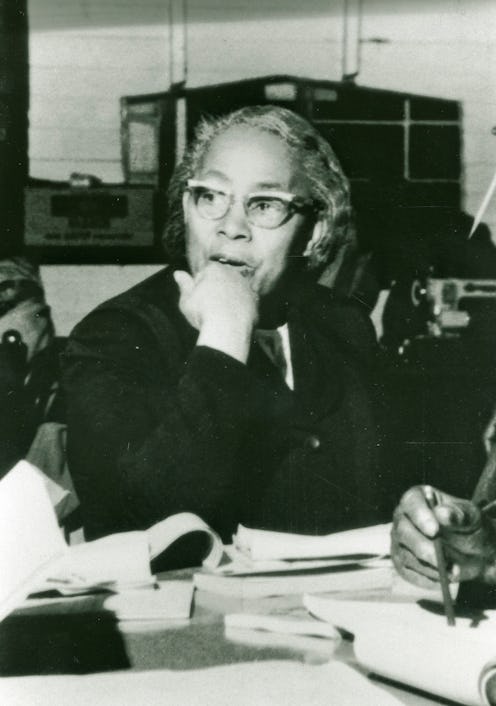News
Every MLK Day, You Forget The Women Who Fought Alongside Him
I am not the biggest fan of MLK Day. Let me clarify: I say this as someone who delivered the “I Have a Dream” speech to my elementary school. I say this as someone who professionally and personally fights for underdogs, as an African American Studies scholar, and as a Black woman. Too often, MLK Day is synonymous with marches, the “I Have a Dream” speech, convoluted colorblind rhetoric, apparel, songs, and the like. Frankly, the appropriation of MLK and MLK Day makes me crazy.
MLK’s civil rights activism undoubtedly influenced other social justice movements, including feminism. But MLK and his Southern Christian Leadership Conference did not fight against sexism. In fact, many Black female civil rights activists were often sidelined into support staff positions, deliberately led away from the spotlight, and urged to put their "race first, gender second."
You might ask: How could sexism exist in an organization and movement led by a man beloved for his fight for equality? As Black communities mobilized for political, economic, and social justice, many adhered to the “politics of respectability” — the belief that if they demonstrated mainstream [White] American values, they would be receive the same civil liberties as Whites. This went beyond dressing professionally, appearing non-threatening, and being non-violent in the face of police brutality.
It also entailed encouraging men to take center stage while women received no credit for doing the emotional, logistical, and intellectual labor of creating and sustaining a movement. Because Black people weren’t immune from patriarchy (no one was), and Black Christian leaders of the day were exalted for their charisma and masculinity, King and the SCLC had an excellent foundation to marginalize women.
Fortunately, the women of the SCLC still got it done, and enlisted and empowered other women to join the fight for civil rights? But who were they? Who were the women that we need to remember every MLK Day, because their work was just as central to the success of the Civil Rights Movement as King’s?
The Women You Need To Know About
Jo Ann Robinson was an English professor at Alabama State College (later university) who served as president of the organization that galvanized King’s Montgomery Bus Boycott. In 1950, Robinson became president of the Women’s Political Council (WPC), an organization dedicated to increasing Black voter registration.
Robinson and the WPC had contacted city commissioners for years about integrating the city buses (Robinson had personally been harassed and chased off of a city bus for not yielding her seat to a White passenger), but the right moment for their desired city-wide bus boycott appeared in 1955 when Rosa Parks was arrested.
That night, Robinson worked with two other WPC members to mimeograph and distribute over 50,000 flyers calling for a bus boycott. Though MLK and others created the Montgomery Improvement Association (MIA) to direct the boycott, Robinson declined an MIA position for fear of losing her job as a professor. She instead served as an executive board member. MLK personally requested that she write the MIA Newsletter.
Ella Baker joined the SCLC in 1958 as Director and possessed a decades-long track record of activism. Prior to her work with the SCLC, she led job training workshops, anti-lynching campaigns, advocated higher salaries for teachers, and mentored rising activists as field secretary and Director of multiple NAACP branches.
After joining the SCLC, Baker had a tenuous relationship with MLK. He initially sought to limit her title, was often unwilling take direction from her, and disagreed with her democratic leadership style and the pace that she wanted to move.
In 1960, Baker left the SCLC to lead what would become the Student Non-Violent Coordinating Committee (SNCC).
Dorothy Cotton served as the Educational Director of the SCLC, 1960-1968, and was one of the highest-ranking women in SCLC leadership. She is most known for her oversight of the Citizens Education Program, where she trained over 8,000 Black people in political participation, voter registration, constitutional rights, and nonviolent protest. Cotton was also known for encouraging singing in her workshops to teach about voting requirements, give attendees a sense of hope and connection, and even spell voting vocabulary to participants who had limited reading and writing skills.
Many of the people pictured in the marches led by MLK were participants in her Citizens Education programs. Cotton went on to accompany MLK to Norway when he received the Nobel Peace Prize and worked as VP of Field Operations for the MLK Jr. Center for Nonviolent Social Change in Atlanta after his death.
Similar to her predecessors, Septima Clark served the SCLC in an educational capacity. As director of education and teaching, Clark used her background as a math and English to lead workshops for members to pass the discriminatory literacy tests that many Southern states required of Black voters. Clark was nearly 60 years old when she joined the SCLC (the Charleston school board fired her for her NAACP membership). She drew on her previous experience setting up citizenship schools for the NAACP Greensboro branch with the likes of Thurgood Marshall and for rising activists like future civil rights darling Rosa Parks. Clark helped create over 800 citizenship schools in her tenure. She retired from the organization in 1970.
This MLK Day, take a moment to remember these women — and the others who were sidelined for far, far too long.
Editor's Note: This op-ed does not reflect the views of BDG Media and is part of a larger, feminist discourse on today's political climate.
